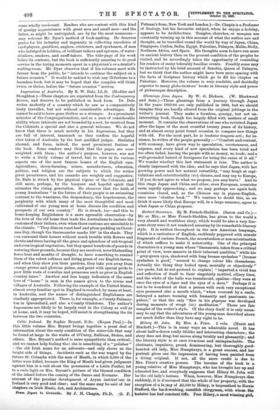Impressions of Australia. By R. W. Dale, LL.D. (Hodder and
Stoughton.)—These chapters are reprinted from the Contemporary Review, and deserve to be published in book form. Dr. Dale writes modestly of a country which he saw as a comparatively hasty traveller, but not without considerable advantages. He cannot be said to have gone thither as a stranger. As a prominent minister of the Congregationalists, and as a man of considerable
ability whose interests are not bounded by a sect, he received from the Colonists a special and also a general welcome. We do not know that there is much novelty in his Impressions, but they are full of interest, inasmuch as they confirm the hopeful view taken of Australia by the best qualified judges. Statistics abound, and form, indeed, the most prominent feature of the book. Some readers may think that the pages are over- weighted with them ; the author's purpose, however, was not to write a lively volume of travel, but to view in its various aspects one of the most famous homes of the English race. Agriculture, sheep-farming, mines, manufactures, education, politics, and religion are the subjects to which the writer gives prominence, and his remarks are weighty and suggestive. Dr. Dale is struck by the physical vigour of the Colonists, and still more, perhaps, by the buoyant and hopeful spirit that animates the rising generation. He observes that the faith of young Australians "in the future of their people is an animating contrast to the weariness, the despondency, the hopelessness, the perplexity with which many of the most thoughtful and most cultivated of our young men at home discuss the condition and prospects of our own country." He is struck, too—and this to home-keeping Englishmen is a more agreeable observation—by the love of the old home that leads the Australians to imitate the customs of their fathers, even when those customs are unsuitable to the climate. "They dine on roast beef and plum-pudding on Christ- mas Day, though the thermometer marks 1000 in the shade. They can surround their houses without much trouble with flowers and shrubs and trees having all the grace and splendour of sub-tropical and even tropical vegetation; but they spend hundreds of pounds in watering their grounds, because they are resolved, notwithstanding fierce heat and months of drought, to have something to remind them of the velvet softness and living green of our English lawns ; and when they show you their gardens, they take you away from orange groves and glorious palms, and point with special pride to poor little roots of cowslips and primroses such as grow in English country lanes." Another and less happy indication of the same love of " home " is seen in the names given to the towns and
villages of Australia. Following the example of the United States, almost every familiar spot in England is recalled, by name at least, in Australia, and the names of distinguished Englishmen are similarly appropriated: There is, for example, a County Palmers- ton in Queensland, and also a County Gladstone. The author's Impressions are likely to be largely read in the Colony as well as at home, and, it may be hoped, will assist in strengthening the tie between the two countries.


















































 Previous page
Previous page